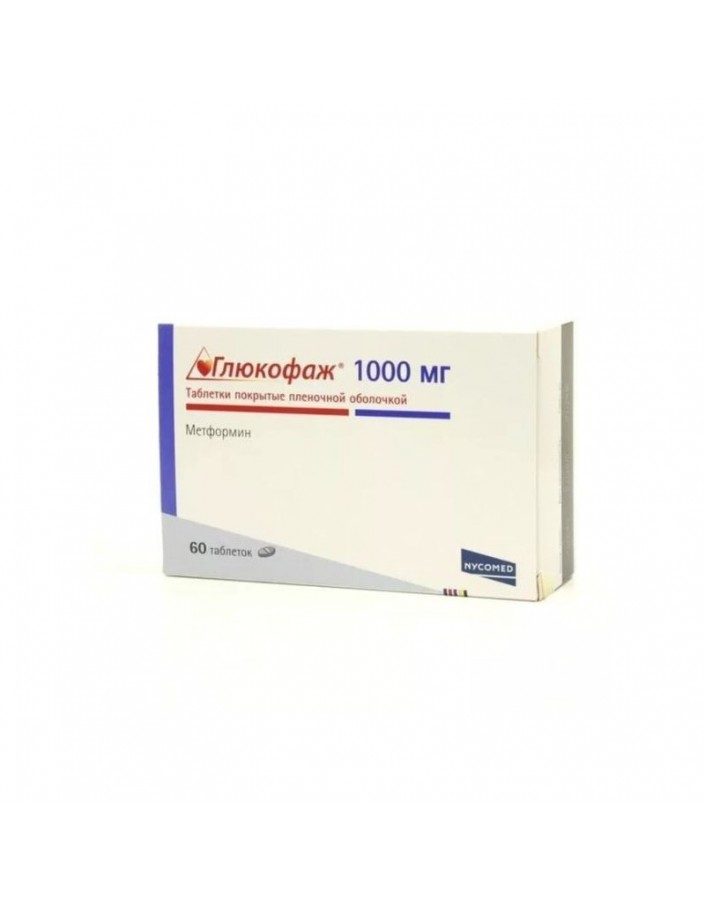




Security policy (edit with Customer reassurance module)

Delivery policy (edit with Customer reassurance module)

Return policy (edit with Customer reassurance module)
Coated tablets:
1 pill contains Metformin hydrochloride 500, 850 or 1000 mg;
Excipients: Povidone K30, Magnesium stearate, hypromellose;
30 or 60 pills per pack.
Glucophage is an oral hypoglycemic drug from the biguanide group.
Increases the sensitivity of peripheral receptors to insulin and stimulates glucose uptake by muscle cells. Inhibits gluconeogenesis in the liver. Delays the absorption of carbohydrates in the intestines. It has a beneficial effect on lipid metabolism: lowers total cholesterol, triglycerides and LDL.
Glucophage reduces hyperglycemia, without leading to the development of hypoglycemia, does not stimulate insulin secretion and does not have a hypoglycemic effect in healthy individuals.
Type 2 diabetes mellitus (non-insulin-dependent) in adults with the ineffectiveness of diet therapy (especially with concomitant obesity);
In combination with insulin in type 2 diabetes mellitus (non-insulin-dependent), especially in severe obesity with secondary insulin resistance.
The initial dose of Glucophage is 0.5-1 g / day. After 10-15 days, a further gradual increase in dose is possible depending on the level of hypoglycemia. Maintenance dose of the drug averages 1.5-2 g / day. The maximum dose - 3 g / day.
To reduce side effects from the gastrointestinal tract, the daily dose should be divided into 2-3 doses.
pills should be taken whole, during or immediately after a meal.
Gastrointestinal: nausea, vomiting, diarrhea, metallic taste in the mouth, lack of appetite, flatulence, abdominal pain (most often occur at the beginning of therapy and pass on their own).
Metabolism: lactic acidosis (requires discontinuation of the drug); with prolonged use - vitamin B12 hypovitaminosis (impaired absorption).
Hemic and lymphatic: in some cases - megaloblastic anemia.
Allergic reactions: skin rash.
- diabetic ketoacidosis, coma, precoma;
- renal dysfunction;
- acute diseases at which there is a risk of development of a renal failure: dehydration, fever, severe infectious diseases, hypoxia (shock, sepsis, kidney infections, broncho-pulmonary diseases);
- Clinical manifestations of hypoxia (respiratory failure, heart failure, myocardial infarction);
- serious injuries and surgical interventions (when insulin therapy is indicated);
- abnormal liver function;
- chronic alcoholism and acute alcohol poisoning;
- lactic acidosis (including a history);
- a period of 2 days before and within 2 days after conducting radioisotope or x-ray studies with the introduction of iodine-containing contrast media;
- compliance with a low-calorie diet (less than 1000 kcal / day);
- pregnancy;
- lactation;
- Hypersensitivity to the drug.
It is not recommended to use the drug in patients older than 60 years who perform heavy physical work, which is associated with an increased risk of developing lactic acidosis in them.
The side effects of the digestive system can be reduced by prescribing antacids, atropine derivatives, or antispasmodics. To avoid the development of these side effects, it is recommended to prescribe Glucophage at the time or at the end of the meal 2-3 times / day. With persistent dyspepsia, Glucophage should be canceled.
During the period of use of the drug is recommended to monitor the function of the liver and kidneys.
Glucophage should be canceled 48 hours before and during the 48-hour period after the X-ray examination using radiopaque agents.
On the background of the use of the drug Glucophage should not drink alcohol and ethanol-containing drugs.
Symptoms: when using Glucophage in a dose of 85 g, hypoglycemia was not observed, but the development of lactic acidosis was noted. Early symptoms of lactic acidosis are nausea, vomiting, diarrhea, fever, pain in the abdomen, muscle pain, further, increased breathing, dizziness, impaired consciousness, the development of coma.
Treatment: immediate cancellation of Glucophage, urgent hospitalization, determination of lactate concentration in the blood; if necessary, conduct symptomatic therapy. For removal of lactate and metformin from the body, hemodialysis is most effective.
Keep out of reach of children at a temperature of 15 ° to 25 ° C.
Glucophage